To understand the Season of Lent and to celebrate it more meaningfully, we must first look at the event that follows it - the Easter Triduum.
The Easter Triduum celebrates the Paschal Mystery (Jesus Christ’s Passion, Death and Resurrection), which is at the heart of the Christian Faith. The Easter Triduum is the most important and solemn of all celebrations and is the summit of our Liturgical Year.
Lent is a season of preparation and repentance. For catechumens, Lent provides the time for final preparation before baptism at Easter. For the baptized, it is a time for recalling the promises of our baptism, realizing how we have failed to live up to them sometimes, and being led to repentance for these faults. Thus, Lent is a time of spiritual purification, conversion, and preparation to worthily celebrate the salvation that Christ won for all.
Lent starts with Ash Wednesday and ends on the afternoon of Holy Thursday. The forty days of Lent are reminiscent of certain events in our Faith: the 40-day great flood during Noah’s time, the 40-year journey of the Israelites in the desert and Jesus’ 40-day fast in the desert. We begin the season by putting crosses made of ashes on our foreheads as a reminder of our baptism (cross) and our repentance for failing in our promises (ashes). This sign of penance signifies the human condition of the sinner (guilt before the Lord and inner conversion expressed exteriorly). This sign also marks the beginning of the way of conversion (developed through the sacrament of penance).
During these forty days, catechumens prepare for their baptism with intense prayer, catechism, and participation in the rites of the Lenten Liturgy by which they are gradually initiated into the Church as the Christian community prays for them.
Be More Attentive to God’s Word
The readings for the season of Lent have been carefully chosen to prepare the faithful for Easter. We are therefore encouraged to have greater attentiveness to the Word of God. Sunday homilies are good opportunities for catechesis on the Paschal Mystery and the sacraments. As much as possible, the texts of the Lectionary are carefully explained, especially the diverse aspects of baptism and the other sacraments in connection with the mercy of God. The faithful should attend weekday
Be Reconciled
Penance is defined as the detestation of sin as an offense against God. The virtue and practice of penance is a necessary part of the preparation for Easter. According to law and tradition, the faithful should approach the sacrament of Reconciliation during this season so that with purified hearts, we may participate in the Paschal Mystery. Pastors should devote themselves to the ministry of reconciliation and provide sufficient time for the faithful to avail of this sacrament.
Fasting, Prayer and Almsgiving are the tripod of Christian spirituality. All Christian faithful are bound to do penance by virtue of divine law. Penitential days are prescribed in which the Christian faithful pray, exercise works of piety and charity, and deny ourselves by fulfilling our responsibilities more faithfully, especially by observing fasting and abstinence (CIC 1249). All Fridays throughout the year are penitential days throughout the universal Church (CIC 1250).
Proclaim a Fast
Fasting is eating only one full meal for the entire day and just smaller meals or snacks to sustain physical activity. It does not prohibit taking food in the morning and evening, observing local custom (Poenitemini III, 1-2). We fast so we can share, not for aesthetic or superficial purposes. Fasting clears the mind to make it more focused on Christ. We share the food or money saved from voluntary fasting with those who are forced to fast because of poverty. Fasting is obligatory for those who have reached the age of majority (18) until the beginning of their sixtieth year (midnight of 59th birthday and the next day) (CIC 1252).
Fasting is also reflected in the liturgical environment during Lent. We fast from the usual festiveness of Sunday. The altar is not decorated with flowers (fasting of the eyes) and musical instruments may be played only to give necessary support to singing (fasting of the ears). We also omit the alleluia in all celebrations even in solemnities and feasts. The chants to be sung in the celebrations, especially in the Eucharist, and devotional exercises should be in harmony with the spirit of the season and the liturgical texts.
Abstinence
Abstinence from meat is to be observed on Fridays throughout the year unless they are solemnities (CIC 1251), Ash Wednesday and Friday of the Passion and Death of our Lord Jesus Christ (CIC 1251). Abstinence forbids the use of meat but not of eggs, the products of milk or condiments of animal fat. Abstinence is a must for all persons who have completed their fourteenth year (CIC 1252).
Pray More
During this season, we are encouraged to pray more. Besides attending weekday Mass and reflecting on the Word of God, we are encouraged to do devotional exercises that are in harmony with the Lenten season such as the Way of the Cross and the Rosary of the Seven Sorrows. Lenten observance should witness to and foster the life of the local Church.
Give More
This season challenges us to do Christian charity through almsgiving. We sacrifice and deny ourselves food and certain luxuries so we can give more to those in need. In Isaiah 58, 5ff, the Lord says that the fasting that he is looking for is ‘releasing those bound unjustly, untying the thongs of the yoke, setting free the oppressed, breaking every yoke, sharing bread with the hungry, sheltering the oppressed and the homeless, clothing the naked, and not turning the back on one’s own.’ Almsgiving should not just be giving from our excess or surplus. Real charity is giving even if it hurts. And almsgiving is not simply giving for the sake of giving, but giving because of love and the desire for the development of the recipient.
Come Back to Life
In conclusion, the word Lent means “spring,” the change from the deadness of cold winter to the warm rays of summer. It is a return to life. Our Lent is also our transition from sin and death to life – the life that Christ gained for us through his passion and death and triumphant resurrection. With fasting, prayer and abstinence, we renew ourselves and turn back to God so that we may fully celebrate the joy of Christ’s redemption on Easter Sunday.
based on the lecture of Fr. Michell Joe Zerrudo
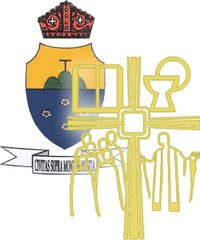


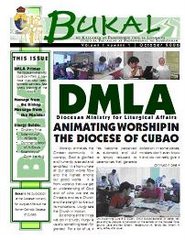
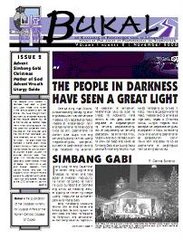
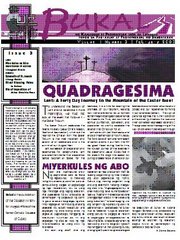
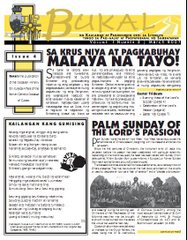

5 comments:
Hello! I'm glad to know that the DMLA of the Diocese of Cubao has this kind of website.
I am a volunteer in our parish (also in the Diocese of Cubao)and am involved in the newsletter team. May I cite some of what you have written here about Lent and St. Joseph in our newsletter?
Thank you.
yes, you may.
and while you're at it, please promote bukal the publication and bukal the blog to your parishmates.
thanks!
thanks, bro. jepjep!
by the way, is this blog the same as the bukal blog that you are talking about?
thanks! God bless!
yes, this is the bukal blog. :D
by the way, which parish are you from and what is your real name? email me at jeffreyvelasco@gmail.com so i can also add you to the liturgicalaffairs yahoo group
hello jepjep,
maganda naman at high tech ang diocese n'yo..ako si ruth, a volunteer in our parish also, San Roque Parish Church in Pasay, sana naka pdf yung mga issues mo ng Bukal...para mabasa ko..
Pintig ng Parokya ang newsletter namin at www.sanroquedepasay.org ang website.
thanks. God Bless!
Post a Comment